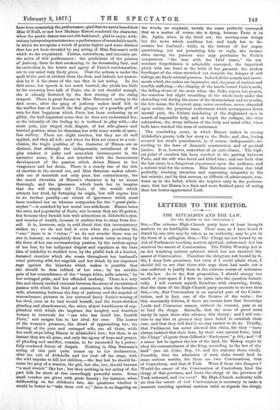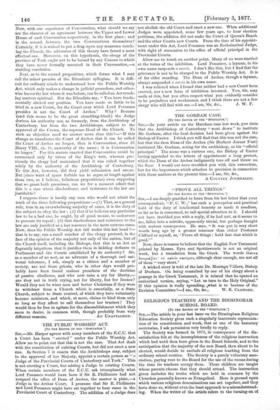LETTERS TO THE EDITOR.
THE RITUALISTS AND THE LAW.
[To ma Eorroa OF THE "SPECTATOR."] SIB,—The extreme High-Church party have at least brought matters to an intelligible issue. Their case, as I have heard it stated by one who may be taken as an authority, may be put in the form of a syllogism, thus,—The Clergy are not bound by an Act of Parliament touching matters spiritual, unless such Act haa received the assent of Convocation. The Public Worship Act is an Act touching matters spiritual which has not received the assent of Convocation. Therefore the clergy are not bound by it. Sir, I deny both premisses, but even if I could admit them, I should fail to see that those who urge them had made out a case sufficient to justify them in the extreme course of resistance to the law. As to the first proposition, I should occupy too much of your space if I were to enter into the question histori- cally. I will content myself, therefore, with observing, firstly, that the claim of the High-Church party amounts to no less than this,—viz., that Convocation is an essential part of the Consti- tution, and in fact, one of the Estates of the realm ; for this necessarily follows, if there are certain laws that Sovereign Lords and Commons cannot, without its consent, pass so as to bind the clergy. Secondly, that the onus of proof must surely lie upon those who advance this theory ; and I will ven- ture to say that at present they have failed to establish their case, and that they will find it no easy matter to do so. Thirdly, that Parliament has never allowed this claim, for they "have always insisted that their laws, by their own natural force, bind the Clergy" (I quote from Gilbert's "Exchequer," p. 60); and "if a canon law be against the law of the land, the Bishop ought to obey the commandment of the King, according to the law of the land" (see ail. Coke, Rep. 72, and the statutes there cited). Fourthly, that the admission of such claim would lead to some curious results, for there are two Convocations, that of Canterbury, and that of York. What if these two disagree ? Would the assent of the Convocation of Canterbury bind the clergy of that province, and leave the clergy of the province of York unbound, and vice versa? My High-Church authority tells me that the assent of both Convocations is necessary to make a measure touching spiritual matters valid as regards the clergy.
Now, with our experience of Convocation, what should we say are the chances of an agreement between the Upper and Lower House of each Convocation respectively, in the first place ; and in the second, between the two Convocations themselves? Certainly, if it is wished to put a drag upon any measures touch- ing the Church, the advocates of this theory have found a most effectual one. Moreover, on this hypothesis, the clergy of the province of York ought not to be bound by any Canons to which they have never formally assented in their Convocation,—a startling conclusion.
Next, as to the second proposition, which forms what I may call the minor premiss of the Ritualistic syllogism. It is diffi- cult for ordinary minds to understand how the Public Worship Act, which only makes a change in judicial procedure, and other- wise leaves the law where it was before, can be called an Acttouch- ing matters spiritual. But the Ritualists say, "You have funda- mentally altered our position. You have made us liable to be tried in a new Court, for the Court over which Lord Penzance presides is not the Court of Arches." Why ? Because (and this seems to be the great stumbling-block) the Judge derives his authority not, as formerly, from the Archbishop of Canterbury, but from the two Archbishops, subject to the approval of the Crown, the supreme Head of the Church. To such an objection need we answer more than this ?—"If this change so transforms the Court of Arches that it can be called the Court of Arches no longer, then is Convocation, since 25 Henry VIII., ch. 19, unworthy of the name ; it is Convocation no longer." For this statute enacted that Convocation could be summoned only by virtue of the King's writ, whereas pre- viously the clergy had maintained that it was called together solely by the authority of the Archbishop of Canterbury. To this Act, however, did they yield submission and assent. But (since want of space forbids me to argue at length against these two, as I believe, fallacious propositions) even supposing that we grant both premisses, can we for a moment admit that this is a case where disobedience and resistance to the law are justifiable ?
I suppose there is hardly any man who would not admit the truth of the three following propositions :—(1) That, as a general rifle, true in an overwhelming majority of cases, it is the duty of the subject to obey the law ; (2) that if he believes any particular law to be a bad one, he ought, by all good means, to endeavour to procure its repeal ; (3) that disobedience and resistance to the law are only justified as a last resource in the most extreme cases. Now, does the Public Worship Act fall under this last head ?- that is to say, can a small number of the clergy pretend, in the face of the opinion of the majority not only of the nation, but of the Church itself, including the Bishops, that this is an Act so flagrantly iniquitous that it justifies them in bidding defiance to Parliament and the Courts established by its authority ? Sir, as a member of no sect, as an advocate of a thorough and uni- versal tolerance, I ask, simply as a citizen and a member of society, are not these priests, who in other days would pro- bably have been found zealous preachers of the doctrine of passive obedience, and who now raise a cry for liberty,— are they not in truth crying, not for liberty, but for licence ? Would they not be wiser men and better Christians if they were to withdraw from a Church which is essentially, as a State Church, subject to State control, of which they have voluntarily become ministers, and which, at most, claims to bind them only so long as they affect to call themselves her trustees ? They would then be free to agitate for the disestablishment which they seem to desire, in common with, though probably from very







































 Previous page
Previous page